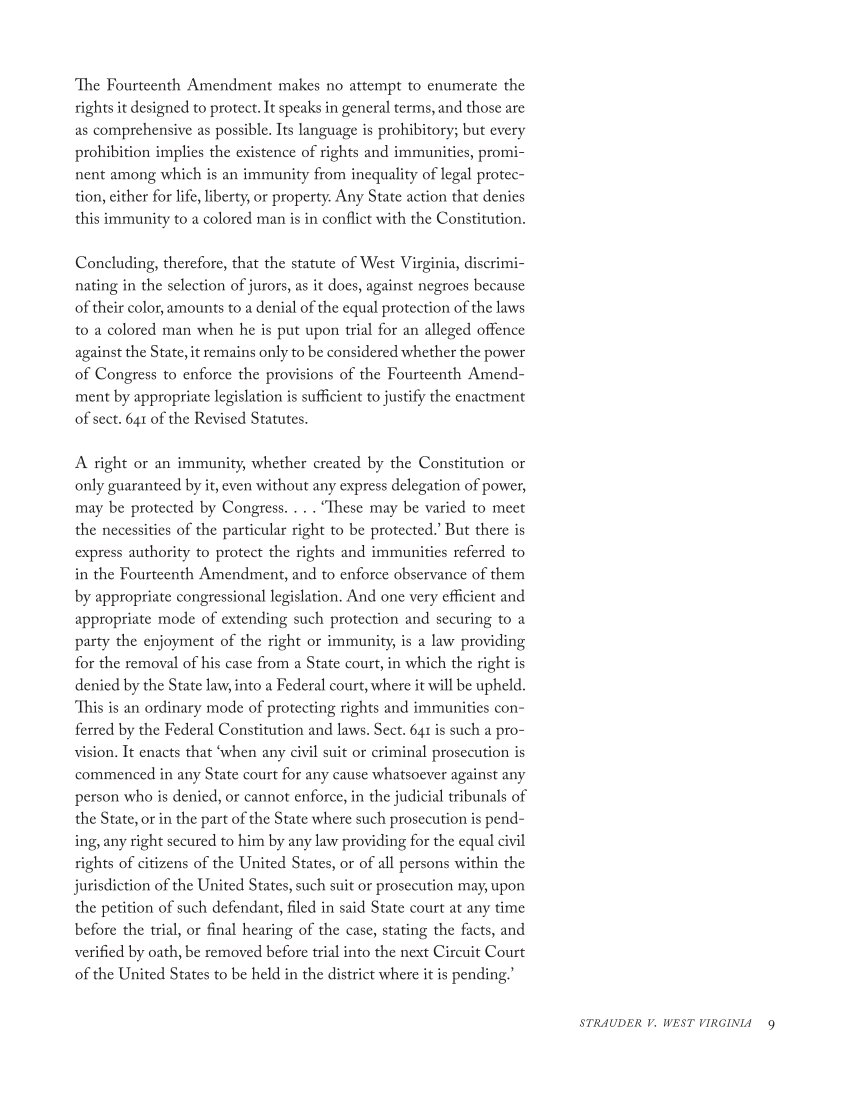strauder v. west virginia 9 The Fourteenth Amendment makes no attempt to enumerate the rights it designed to protect. It speaks in general terms, and those are as comprehensive as possible. Its language is prohibitory but every prohibition implies the existence of rights and immunities, promi- nent among which is an immunity from inequality of legal protec- tion, either for life, liberty, or property. Any State action that denies this immunity to a colored man is in conflict with the Constitution. Concluding, therefore, that the statute of West Virginia, discrimi- nating in the selection of jurors, as it does, against negroes because of their color, amounts to a denial of the equal protection of the laws to a colored man when he is put upon trial for an alleged offence against the State, it remains only to be considered whether the power of Congress to enforce the provisions of the Fourteenth Amend- ment by appropriate legislation is sufficient to justify the enactment of sect. 641 of the Revised Statutes. A right or an immunity, whether created by the Constitution or only guaranteed by it, even without any express delegation of power, may be protected by Congress. . . . ‘These may be varied to meet the necessities of the particular right to be protected.’ But there is express authority to protect the rights and immunities referred to in the Fourteenth Amendment, and to enforce observance of them by appropriate congressional legislation. And one very efficient and appropriate mode of extending such protection and securing to a party the enjoyment of the right or immunity, is a law providing for the removal of his case from a State court, in which the right is denied by the State law, into a Federal court, where it will be upheld. This is an ordinary mode of protecting rights and immunities con- ferred by the Federal Constitution and laws. Sect. 641 is such a pro- vision. It enacts that ‘when any civil suit or criminal prosecution is commenced in any State court for any cause whatsoever against any person who is denied, or cannot enforce, in the judicial tribunals of the State, or in the part of the State where such prosecution is pend- ing, any right secured to him by any law providing for the equal civil rights of citizens of the United States, or of all persons within the jurisdiction of the United States, such suit or prosecution may, upon the petition of such defendant, filed in said State court at any time before the trial, or final hearing of the case, stating the facts, and verified by oath, be removed before trial into the next Circuit Court of the United States to be held in the district where it is pending.’
Document Details My Account Print multiple pages
Print
You have printed 0 times in the last 24 hours.
Your print count will reset on at .
You may print 0 more time(s) before then.
You may print a maximum of 0 pages at a time.


































































































































































































































































